7 Powerful Rosemary Oil Uses for Hair You Need to Know
Introduction:
- In a world where thinning, slow hair growth, and hair loss have become frequent problems, many people are looking to nature for solutions.
- Rosemary Oil Uses for Hair is one of the numerous herbal medicines that has become well-known for being an effective natural way to encourage hair growth.
- The necessary nutrients, anti-inflammatory qualities, and antioxidants found in rosemary oil, which is extracted from the fragrant herb Rosmarinus officinalis, stimulate hair follicles, increase scalp circulation, and fortify hair from the ground up.
- However, the growing body of research supporting rosemary oil’s efficacy for hair care is what really distinguishes it from other oils, in addition to its traditional medical history.
- This essential oil has the potential to revolutionize your hair care regimen by increasing hair growth and decreasing dandruff.
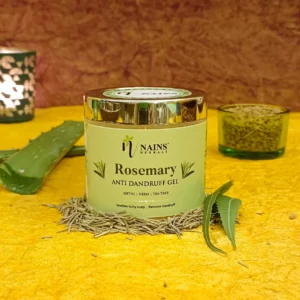
1. Stimulates Hair Growth at the Root:
- Overview:
- Blood circulation is one of the main elements that affects how well your hair grows, and hair development starts at the root.
- Your hair follicles may become weak, malnourished, or even inactive if your scalp does not receive enough blood flow.
- Herein lies the role of rosemary oil, a potent natural stimulant.
- Rosemary oil, well-known for its fragrant aroma and therapeutic benefits, possesses the special capacity to increase blood flow in the scalp, igniting dormant hair follicles and promoting quicker, healthier hair growth.
- Reduced hair loss, the emergence of baby hairs in bald areas, and generally faster hair growth are all common outcomes reported by those who use rosemary oil in their hair care regimen.
- After only 4–6 weeks of use, many customers report a noticeable improvement in hair structure and scalp health.
- It is frequently mixed with a carrier oil, such as jojoba, coconut, or almond oil, and massaged into the scalp.
- Some even incorporate a few drops into their conditioners and shampoos.
- Users eventually describe a warming or tingling sensation on their scalp, which is an obvious indication that the follicles are being awakened and blood flow is growing.
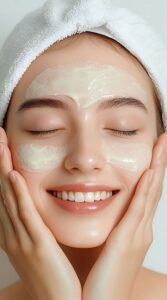
- There is scientific evidence to support the anecdotal belief that rosemary oil increases blood circulation.
- A 2015 clinical research that was published in Skinmed contrasted the popular chemical hair growth treatment minoxidil 2% with rosemary oil. Both groups saw comparable increases in hair count after six months, demonstrating that rosemary oil is not just a natural substitute with fewer negative effects but also an effective one.
- Cineole and rosmarinic acid, which are both found in rosemary oil, are recognized for their ability to dilate blood vessels.
- Applying rosemary oil to your scalp helps to expand capillaries, which enables more oxygen, vitamins, and nutrients to reach each follicle.
- Vasodilation is the term for the expansion of blood vessels.
- Essential oils like rosemary are increasingly being suggested by dermatologists and trichologists as part of holistic hair loss treatments.
- Ayurveda and integrative medicine have long acknowledged rosemary’s capacity to “awaken” the body’s energy and circulation.
- Experts claim that regularly massaging the scalp with rosemary oil prolongs the anagen phase, or the active growth phase of hair, in addition to reviving dormant follicles.
- Since the body is most relaxed after bathing or before bed, rosemary oil is often utilized in these traditional practices to promote deeper absorption and better outcomes.

- Always use 100% pure, steam-distilled rosemary essential oil to reap the full benefits safely.
- It must be combined with a carrier oil in a concentration of 2–3% before being applied straight to the scalp without dilution.
- For one application, for instance, two to three drops in one tablespoon of carrier oil are sufficient.
- Before using, conduct a patch test to make sure there won’t be any allergic reactions.
- Before using essential oils, women who are pregnant or nursing should speak with their doctor.
- Massage into the scalp two or three times a week and let it sit for at least half an hour before washing for best benefits.
- The majority of people get effects in 6–12 weeks, therefore consistency is essential.
2. Helps Prevent Hair Thinning
- One of the first and most prevalent indications of compromised scalp health is hair thinning.
- It usually starts out subtle – your hair strands break more easily, your scalp is more noticeable, and your ponytail feels thinner.
- Although there are numerous contributing elements to this issue, such as stress, hormone imbalance, bad diet, or harsh products, rosemary oil provides a natural remedy.
- Rich in antioxidants, anti-inflammatory substances, and vitamins, rosemary oil helps fortify hair strands from the inside out, lowering the likelihood of breakage and thinning.
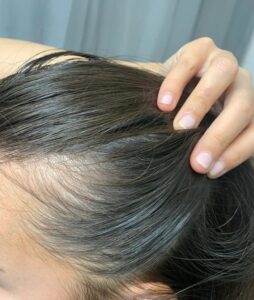
- What Actual Users Say:
- Many people who use rosemary oil report observable increases in thickness and texture, particularly those who suffer from weak, fine hair.
- After a few weeks of use, users have experienced stronger hair that doesn’t break easily, less visible scalp in regions where thinning had previously occurred, and less hair strands left in the shower drain.
- Over time, applying rosemary oil as part of a scalp massage two to three times a week frequently results in hair that feels fuller and has better density.
- Because both castor and almond oils are known to have strengthening qualities, users frequently combine rosemary oil with them and apply the mixture before washing.
- The Cellular Mechanisms of Rosemary Oil:
- Hair thinning is significantly lessened by the active ingredients in rosemary oil, such as carnosic acid, ursolic acid, and rosmarinic acid.
- As potent antioxidants, these substances aid in the defense against oxidative stress in the tissues of the scalp.
- By scavenging free radicals, rosemary oil lessens the damage that oxidative stress causes to hair follicles and decreases hair structure.
- Furthermore, by promoting cellular regeneration and providing the hair shaft with vital minerals like vitamin E, iron, and calcium, the nutrients in rosemary oil enhance the health of the scalp.
- In addition to preventing hair thinning, this deep inside feeding promotes thicker regrowth.
- Support from Experts and Historical Use:
- For patients with early-stage alopecia or genetic hair thinning, hair specialists and herbalists frequently incorporate rosemary oil into their therapy regimens.
- For millennia, rosemary has been utilized in Mediterranean and Ayurvedic traditions to strengthen weak hair and revitalize the scalp.
- By promoting the dermal papilla cells and the extracellular matrix, which are essential for the strength and structure of hair strands, researchers have discovered that rosemary oil combats the underlying reasons of thinning rather than just its symptoms.
- By strengthening these biological elements, each hair strand develops into one that is thicker, stronger, and less likely to break.
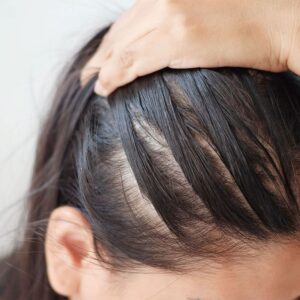
- Application Safety and Extended Use:
- When used properly, rosemary oil is generally safe for most people.
- Always use a tablespoon of a healthy carrier oil, such as castor, olive, or jojoba oil, to dilute three to four drops of rosemary essential oil.
- Because it can irritate the scalp, avoid putting undiluted oil straight on it.
- The oil combination should be gently massaged into the scalp for 5 to 10 minutes, left on for at least 30 to 60 minutes, and then washed off with a light shampoo for optimal effects.
- Before applying the product fully, people with sensitive skin should do a patch test.
- Before using a medicine regularly, those who are pregnant, nursing, or on certain medications should speak with their doctor.
3. Reduces Dandruff and Flakiness
- Overview
- Almost 50% of people worldwide will experience dandruff at some point in their lives.
- It is a sign of an unhealthy scalp environment and is characterized by itching, flaking, irritation, and dryness.
- Commercial shampoos frequently include harsh chemicals that further dry out the scalp, even though they provide momentary relief.
- On the other hand, rosemary oil provides a mild, organic solution.
- Its moisturizing, antifungal, and anti-inflammatory qualities address the underlying causes of dandruff rather than just its symptoms.

- Actual Outcomes:
- When using rosemary oil once a week, those who suffer from flaking, dry scalp, and chronic dandruff frequently see steady alleviation.
- A significant decrease in apparent flakes, calmer scalp conditions, and a lessened need to scratch are all common testimonials.
- Many people choose to add a few drops of rosemary oil to their gentle, sulfate-free shampoo or use it as a scalp massage before shampoo.
- Regular use has shown results in as little as two to four weeks, especially when paired with other oils that soothe the scalp, such as eucalyptus or tea tree oil.
- The Science That Underlies It:
- Rosemary oil has strong antifungal and anti-inflammatory properties due to the presence of rosmarinic acid, cineole, and carnosol.
- Malassezia, a yeast that grows on oily scalps and irritates them, is one of the main fungi that cause dandruff.
- Rosemary oil reduces irritation brought on by this fungus and aids in limiting its spread.
- Its inherent astringent qualities also counteract excessive sebum production, which can result in bacterial accumulation and greasy flakes.
- The skin’s microbiome is supported by rosemary oil, which keeps it hydrated and in balance, in contrast to chemical-laden dandruff shampoos that can deplete the scalp of natural oils.
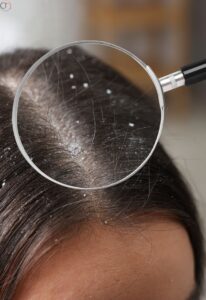
- Sustainable and Secure Use:
- Combine three to four drops of rosemary oil with a carrier oil, such as coconut oil, which also has antifungal qualities, and gently massage into the scalp to combat dandruff.
- Use it overnight or leave it on for 30 to 60 minutes before washing.
- Another option is to put five to six drops straight into your paraben-free shampoo bottle.
- Purchase therapeutic-grade, 100% pure rosemary essential oil at all times. Steer clear of oils with additional aroma or synthetic counterparts.
- Before using, perform a patch test.
- Regular use of this solution is safe, and people with sensitive or allergy-prone skin will benefit most from it.
3. Reduces Dandruff and Flakiness:
- Sustainable and Secure Use:
- Combine three to four drops of rosemary oil with a carrier oil, such as coconut oil, which also has antifungal qualities, and gently massage into the scalp to combat dandruff.
- Use it overnight or leave it on for 30 to 60 minutes before washing.
- Another option is to put five to six drops straight into your paraben-free shampoo bottle.
- Purchase therapeutic-grade, 100% pure rosemary essential oil at all times.
- Steer clear of oils with additional aroma or synthetic counterparts. Before using, perform a patch test.
- Regular use of this solution is safe, and people with sensitive or allergy-prone skin will benefit most from it.

- The Scientific Underpinnings of Treating Dandruff with Rosemary Oil:
- The efficacy of rosemary oil is attributed to its active components, which include rosmarinic acid, cineole, and carnosol. These offer:
- Antifungal action: It helps stop Malassezia, the yeast that often causes dandruff, from growing.
- Benefits for decreasing inflammation:
- It calms the skin’s surface, reducing irritation, redness, and flakiness.
- Rosemary helps keep sebum in the right proportions, avoiding both oily and dry dandruff.
- Improved circulation: More blood flow to the scalp promotes a healthy scalp barrier and the healing of damaged skin.
- A 2017 review of research on natural antifungals suggested that rosemary oil might help cure fungal infections of the scalp.
- Supported by Professionals and Antiquated Customs:
- For millennia, Ayurvedic, Greek, and Roman medicine have utilized rosemary to treat conditions involving the skin and scalp, including inflammation.
- These days, integrative doctors advise using rosemary oil as a natural way to treat dandruff, particularly for those with psoriasis, sensitive skin, or scalps prone to eczema.
- It is frequently used in aromatherapy and scalp massage regimens to balance the pH of the scalp and aid in cleansing.
- Because of its non-toxic, well-tolerated, and multipurpose qualities—which include treating inflammation and scalp infections—clinical aromatherapists and holistic trichologists recommend rosemary oil.
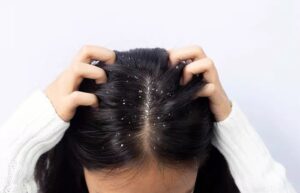
4. Prevents Premature Graying:
- Overview:
- Even those in their 20s and 30s are increasingly experiencing premature graying.
- Environmental factors, inadequate nutrition, and oxidative stress are key contributors, however heredity also plays a part.
- Your natural hair color fades and turns gray or white as the melanocytes, which produce melanin, in your hair follicles start to slow down or break down.
- The good news is that rosemary oil might be able to postpone this process.
- Your natural hair color is preserved and keeps looking young for longer with rosemary oil’s potent antioxidants and cellular-supporting components.
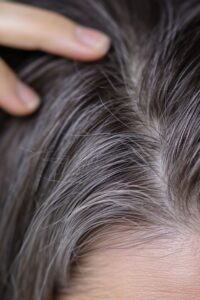
- Users Observe Darker Tone and Delayed Graying:
- The natural color of their hair has been gradually retained by many users who regularly apply rosemary oil to their scalp, and in certain instances, premature gray hair strands have even darkened.
- After 6 to 8 weeks of regular use, those with early symptoms of graying report that their hair looks darker, glossier, and more vibrant.
- Warming a mixture of black seed oil and rosemary oil and massaging it into the scalp three to four times a week is a common technique.
- Some people even use rosemary tea rinses into their hair care regimen.
- The effects are long-lasting and natural, even though the change may be slow.
- Scientific Perspectives on Preventing Graying:
- The primary cause of premature graying is a reduction in melanin, the pigment that gives hair its color.
- Strong antioxidants called carnosic acid and rosmarinic acid, which are abundant in rosemary oil, prevent oxidative damage to melanocytes.
- According to studies, rosemary oil may prevent the synthesis of melanin by:
- Eliminating harmful free radicals that harm melanocytes
- enhancing blood flow to hair follicles and supporting cells that produce pigment
- Boosting the health of the scalp and creating the ideal conditions for pigment retention
- Additionally, hydrogen peroxide accumulation in the scalp, an endogenous component associated with early graying, is lessened by rosemary oil.
- Melanin is bleached from the inside out by too much hydrogen peroxide.
- The antioxidant properties of rosemary aid in reducing this oxidative stress, which may delay the aging process of hair follicles.
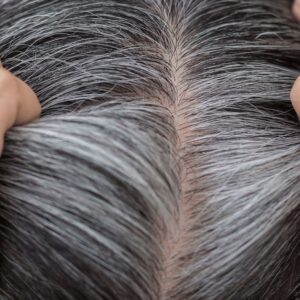
- Tips for Safe Application:
- For optimal effects, combine 1 tablespoon of a carrier oil (such as castor or almond oil) with 4–5 drops of pure rosemary essential oil.
- After 5–10 minutes of massaging the scalp, let it sit for an hour or overnight, and then rinse with a sulfate-free shampoo.
- As an alternative, make a hair rinse by boiling fresh rosemary leaves in water and use it to wash your hair two or three times a week.
- Prior to full application, perform a patch test as usual.
- Although rosemary oil is usually harmless, people with sensitive skin or certain medical issues should speak with a doctor.
5. Controls Excess Oil Production:
- Overview:
- It might be annoying to have an overly greasy scalp. In addition to making hair appear oily, it also fosters an environment that is more likely to cause dandruff, clogged follicles, and even hair loss.
- Conversely, excessive cleaning to get rid of oil can dry up the scalp, which starts a vicious cycle of oil production.
- The answer? Not eradication, but balance.
- This is the perfect time for rosemary oil.
- Both oily and dry scalp types can benefit from rosemary oil’s natural astringent and regulating qualities, which help reduce sebum (oil) production without depriving the scalp of necessary moisture.

- Scalp balance is visible to real people:
- Rosemary oil has been a game-changer for people with weak hair and oily roots.
- Frequent users say they need fewer weekly washes since their hair stays fresher for longer.
- There is a noticeable decrease in the itching, accumulation, and sticky, greasy feeling of the scalp.
- Because rosemary oil rebalances the entire scalp without making the remaining hair dry or brittle, users with combination scalp disorders (oily roots + dry ends) also adore it.
- Before washing, many people apply a mixture of grapeseed and rosemary oils, while others add a few drops to their shampoo or conditioner for everyday balancing.
- How Sebum Production Is Balanced by Rosemary Oil:
- The natural oil that the scalp’s sebaceous glands produce is called sebum. Excessive production can result in oily hair, plugged pores, and acne on the scalp. Dryness and flaking are the results of underproduction. Rosemary oil aids in preserving ideal sebum levels by:
- serving as a natural astringent to reduce oil production and tighten pores
- Increasing blood flow to support equilibrium and nourish the scalp
- lowering inflammation, which can trigger an overreaction of the sebaceous glands
- promoting the equilibrium of the microbiota, which is necessary for normal scalp function
- By soothing overworked sebaceous glands and maintaining a moisturized and nourished scalp, the active ingredients in rosemary oil, such as carnosol and rosmarinic acid, directly promote these processes.

- Supported by Clinical Practice and Herbal Tradition:
- Rosemary has traditionally been utilized in herbal medicine as an oil balancer and scalp clarifyer.
- Rosemary was considered a purifying herb for the body and scalp by the ancient Greeks and Romans.
- Since rosemary oil can control oil without clogging pores or drying out the skin, many holistic dermatologists and scalp care specialists now incorporate it into non-comedogenic scalp treatment regimens.
- In order to restore pH and remove sebum accumulation, it is frequently combined with witch hazel or apple cider vinegar in scalp detoxification treatments.
- How to Use It Effectively and Safely
- Using rosemary oil to reduce excess oil:
- Combine three to four drops of rosemary oil with a light carrier oil, such as jojoba or grapeseed oil.
- Before shampooing, massage your scalp. For 20 to 30 minutes, leave it on.
- Additionally, you can use a rosemary tea rinse or add four to five drops of rosemary oil to your usual shampoo.
- Two to three times a week, use this. Applying to injured or irritated skin should never be done without first doing a patch test.
6. Improves Hair Texture and Shine:
- Overview:
- Shiny, healthy hair is a global representation of beauty and vigor. However, regular exposure to harsh chemicals, heat styling, pollution, and environmental stressors can make hair appear frizzy, rough, and lifeless.
- While many hair care products promise shine, they frequently contain silicones or oils that promote buildup or weigh down hair.
- One natural element that is particularly noteworthy is rosemary oil, which not only provides deep nourishment to hair but also gradually improves its texture and sheen.
- It softly smoothes the cuticle of the hair, minimizes frizz, and brings back the hair’s brilliant, natural shine.

- The Science of Improving Texture and Shine:
- Because of its high content of antioxidants, vital fatty acids, and nutrients, rosemary oil has been shown to enhance the texture and sheen of hair. These consist of substances such as cineole, camphor, and rosmarinic acid, which:
- Enter the hair shaft to provide internal nourishment and strength.
- Reduce surface roughness to smooth the hair cuticle, improving light reflection and producing a natural sheen.
- Lock in moisture and hydrate parched hair to avoid a frizzy, brittle appearance.
- Aid in shielding hair from oxidative damage brought on by pollutants and UV rays, which dulls the appearance of hair.
- Strong, healthy hair growth that is inherently more glossy is supported by rosemary oil, which also helps to preserve the health of the scalp and improve circulation.
- Based on Customs and Applied Today:
- Because of its ability to improve hair, rosemary has been valued for generations in Middle Eastern and Mediterranean cultures.
- Herbal medicine texts extensively detail the use of rosemary in traditional hair rinses and oil treatments to promote soft, lustrous hair.
- Professional trichologists and hair care experts now suggest rosemary oil as a safe, all-natural method to enhance hair structure, particularly for people whose hair has been chemically treated or damaged by heat.
- The increased desire for clean, botanical-based hair care is reflected in its increasing inclusion in natural shampoos and conditioners.
- Tips for Safe Application: Use rosemary oil to improve the texture and sheen of your hair.
- Three to five drops of essential rosemary oil should be diluted in one tablespoon of a carrier oil, like coconut, jojoba, or argan.
- Apply from scalp to tips, paying special attention to damaged or dry ends.
- For deep conditioning, let it on for 30 minutes or overnight, and then rinse with a mild shampoo.
- As an alternative, try rosemary-infused hair rinses two to three times a week or add a few drops to your conditioner.
- Patch testing should always be done before use. Although rosemary oil is typically harmless, keep it away from broken skin and eyes.
7. Fights Scalp Infections:
- Overview:
- The basis for robust, colorful hair is a healthy scalp. Unfortunately, this equilibrium can be upset by bacterial, fungal, or yeast-induced scalp infections, which can result in itching, redness, inflammation, and even hair loss.
- Common ailments including as fungal infections, seborrheic dermatitis, and folliculitis are frequently left untreated or made worse by harsh chemical treatments.
- Thankfully, the potent antibacterial and antifungal qualities of rosemary oil provide a natural defense to keep your scalp clear of infections that could impede hair growth.

- The Science Underpinning the Antimicrobial Properties of Rosemary Oil
- Numerous bioactive substances found in rosemary oil, including cineole, camphor, and alpha-pinene, have been shown by science to possess broad-spectrum antibacterial properties. These substances:
- Stop the development of fungus and bacteria that are frequently linked to scalp diseases.
- Assist in breaking down microbial biofilms that cause illnesses to become resistant and persistent.
- Cut down on microbial irritation-induced scalp inflammation
- Encourage the scalp’s skin to repair and regenerate
- According to clinical research, rosemary oil works well against bacteria including Malassezia yeast, which causes dandruff and seborrheic dermatitis, and Staphylococcus aureus, which is a major bacterial cause of folliculitis. The natural microbiome of the scalp is supported by rosemary oil, which acts gently in contrast to strong medications.
- Encouraged by Current Research and Conventional Use:
- As an antibacterial and scalp tonic, rosemary has been utilized for ages in traditional medical systems like Ayurveda, Mediterranean herbalism, and European folk medicine.
- Because of its effectiveness and safety record, modern dermatologists and trichologists frequently suggest rosemary oil as an adjunct to traditional scalp treatments.
- With increasing proof from laboratory studies to support these advantages, it is also frequently found in natural hair care products meant to preserve scalp hygiene and avoid infections.
- Guidelines for Safe and Effective Use:
- To take use of the antibacterial properties of rosemary oil for the scalp:
- One tablespoon of carrier oil, such as jojoba, coconut, or olive oil, should be used to dilute three to five drops of rosemary essential oil.
- For five to ten minutes, gently massage the scalp to promote circulation and distribute antibacterial substances.
- After 30 minutes or overnight, rinse with a gentle shampoo that doesn’t include sulfates.
- For everyday protection, mix a few drops into your shampoo or conditioner.
- Patch testing should always be done before use. To avoid irritating the scalp, do not apply undiluted rosemary oil directly to it. If you suffer from serious scalp issues, see a doctor.
FAQS
1. How often should I use rosemary oil for hair growth?
For best results, apply rosemary oil 2–3 times per week. You can either mix it with a carrier oil and massage into your scalp or add a few drops to your shampoo.
2. Can I apply rosemary oil directly to my scalp?
No. Pure rosemary essential oil is very potent and should always be diluted with a carrier oil (like coconut, castor, or jojoba oil) to avoid irritation.
3. How long does it take to see results with rosemary oil?
Most users begin to notice improvements in hair strength, shine, and reduced hair fall within 4 to 6 weeks of consistent use. Full results, including hair regrowth, may take 3–6 months.
4. Can rosemary oil help with dandruff?
Yes. Its anti-inflammatory and antifungal properties make it effective in treating dandruff and soothing an itchy, flaky scalp.
5. Is rosemary oil suitable for all hair types?
Absolutely. Rosemary oil works well for all hair types—whether your hair is dry, oily, curly, or straight. Just adjust the carrier oil to match your scalp’s needs.
6. Does rosemary oil prevent hair thinning or balding?
Yes. Rosemary oil stimulates blood circulation in the scalp, strengthens follicles, and can reduce thinning and early-stage hair loss, especially when used regularly.
7. Can I leave rosemary oil in my hair overnight?
Yes, many people apply a rosemary oil blend overnight as a deep treatment. Just be sure it’s well-diluted and cover your pillow to avoid staining.
8. Does rosemary oil darken gray hair or reverse graying?
While it can’t reverse genetics, rosemary oil may slow down premature graying by supporting melanin production and fighting oxidative stress in the scalp.
9. Is rosemary oil safe during pregnancy or for children?
Pregnant women and children should consult a doctor before using essential oils. While generally safe when diluted, rosemary oil can sometimes be too strong for sensitive skin.
10. Can I mix rosemary oil with other oils for better results?
Yes. It pairs well with castor oil for growth, tea tree oil for dandruff, and lavender oil for relaxation. Always ensure proper dilution and patch test before use.
